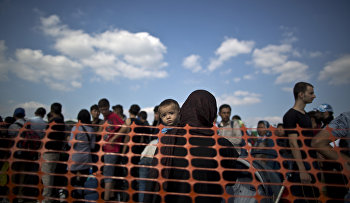Washington until now has refrained from giving in to Vladimir Putin’s plans regrading negotiations on Syria, Ukraine, and Western sanctions against Russia. Uncertainty is still in the air concerning US's alternative plan, despite the influx of perplexing diplomatic statements by Barack Obama, Secretary of State John Kerry, and Secretary of Defense Ashton Carter. In contrast, the geopolitical realities seem to be more adept to the Russian efforts, as well as to the framework of the US-Russian rivalry, in which Syria is the focal point. Anyway, Syrian people pay a triple cost for its freedom: one for its regime; another for its regional forces who have their own goals and interests, which have nothing to do with rights or ambitions; third for Washington and Moscow and their global struggle on the Syrian territory.
The global system
The US continued its hegemony in the unipolar system of power since the collapse of the Soviet Union in 1991. Meanwhile Russia concentrated on its internal problems. As time goes by, global balance has shifted, as the US continues being the main player in the unipolar system, despite the relative recession — mainly due to the inability of global superpowers to compete, and not because of the US's increasing capabilities enabling it to dominate global players.
As Russia is making a comeback as a superpower, it defies present US domination over the world, using the areas of interest left behind by the US to its advantage to break this unipolar structure. This is justified by the Russian objection to the US invasion of Iraq in 2003, where it was limited to the use of “veto” in the Security Council. Russia abstained from voting on Resolution 1973, allowing NATO to establish a no-fly zone in Libya, using military strikes against the regime, leading to the overthrow of the government in 2011. Putin's Russia has never surrendered to the global system of US domination. The balance of world powers then allowed for any interferences in the Middle Easter, but now things are different. Russian involvement in Syria is not limited to fighting ISIL, or supporting Syrian regime, or being involved in the Iranian axis of powers, it is much more than that.

Middle East is witnessing a total change, as non-Arab powers are gaining influence, in the light of Obama’s plan for the region and the recent Russian involvement. After the nuclear deal between Iran and the West, the White House administration became more optimistic, adding Iran as an integral part of its strategy for political normalization and economic penetration of the region, besides its alliances with the regional powers (Turkey, Israel, Saudi Arabia and Egypt). If Obama wins his gamble, the US can pull the strings in the Mideast region from their side of the ocean, and then Washington will have the ability and time to fight China in its geographic vicinity through building a shield consisting of Japan, Taiwan, South Korea and may be Vietnam.
To reach this strategic goal, Barack Obama intends to form a global alliance, using the pretense of a fight against ISIL, although that is not a direct purpose of the mission. On the contrary, the goal is to push local forces in Syria and Iraq, as well as competing regional powers to join in the war against ISIL in order to install the regional system the US is looks for — a system in which local forces in the Middle East will continuously struggle under the US's umbrella without exhausting their powers. This became totally clear with the frequent joint airstrikes with the Arab forces and Turkey, and at the same time facilitating land operations against the terrorist organization on Iraqi territories through local groups loyal to Iran.
US strategy is to 'partition Syria' and install a puppet regime https://t.co/4acM6UtK9m pic.twitter.com/9C7qsvMzq8
— Press TV (@PressTV) October 25, 2015
From the Russian perspective, such regional system means a catastrophe to Moscow’s global ambitions, as it will be the first time in history of the Middle East, that a single power dominates without a rival, and what if this power is the US. To prevent the White House achieving this plan, Moscow intentionally tried to influence global and regional powers by its late military intervention on the Syrian coast. Russia’s strategic interest concerning Iran lies in two contradictory things: first is to prevent any deterioration between Iran and the US into military confrontation, as Iran is a major Russian ally in the Arabian Gulf and the eastern Mediterranean. Second, its interest is to avert improvement of Iran-US relations to the level of a strategic alliance between Tehran and Washington, as the case was during the reign of the Shah. This will lead to Russia losing its interests in Iran for the interests of Washington. And that will block Russia’s path to the Gulf, just as in “The Great Game” between Britain and Russia in the 18 and 19 centuries, and then between the USA and USSR at the time of the Cold War. These are Russian calculations in the global geopolitical sphere.
Media gibberish and geo-political facts
Supporters of Iran declare “the victory of the axis with Russia under the leadership of Putin,” on the other hand, supporters of Saudi Arabia, condemn what they called: “Moscow’s submission to Qassem Solaimany’s plan,” and that “Russia’s intervention in Syrian is against the Sunnis,” as if Moscow is working under the command of Iran, and the US airstrikes against ISIL mean victory for Sunnis, while Russian airstrikes are against them. Amid all of this, the two rivals and their media forgot that Russia is a global power surpassing Iran in the global arena. Consequently, the global superpower is logically and practically more adept influencing choices of regional powers, and the Russian intervention in Syria is no answer to Iran's mission.
Russia, US, Turkey and Saudi fail to agree on Syria https://t.co/HKtdsP4Y2l pic.twitter.com/lUuh6PErRg
— AJE News (@AJENews) October 23, 2015
It is a Russian plan, in the framework of balances of a global system in the Middle East, mentioned above. Direct negative result of the Russian intervention in Syria is that Moscow will be the main player in negotiations on the Syrian regime as it has all the cards in hand. Another negative result is that the balance in Syria is overturned, thus the local powers have no longer a monopoly in the area of conflict management, that right has been passed on to the global players dominating the conflict. The last negative result is that the Syrian president is no longer a target in the current conflict; he is just an intermediary. This does not mean that Iran will be a loser in the present struggle, but the challenges it faces are not easy.
It is too early to form any conclusions on the Russian intervention in Syria, since Obama resents the idea of accepting Russian trade-off. US-Russian understanding is limited to military coordination in Syria to avert any clashes between each side's planes, without extending this process to Ukrainian crisis or western sanctions against Russia. This is because the subject of Russia is not on the partisan agenda of the US, with respect to President Obama's policies and tendencies, but it is the subject of an institutional distinction of Washington's global conflicts.
#Obama will leave office with #Assad still in power – lawmaker https://t.co/fL383nhO4m pic.twitter.com/yKkLtDq46A
— Sputnik (@SputnikInt) October 25, 2015
2016 elections are of a great concern for Barack Obama, therefore it is in his interest to appear strong in front of Russia, thus reenforcing the chances of the Democratic party. The US and regional powers sometimes forget that Russia is much more than just an emerging international power. Washington is well aware that the unipolar system dominated by US alone for more than two decades is a part of the past. The weeks to come will be pivotal and critical time for Syria, as the global climate changes.






